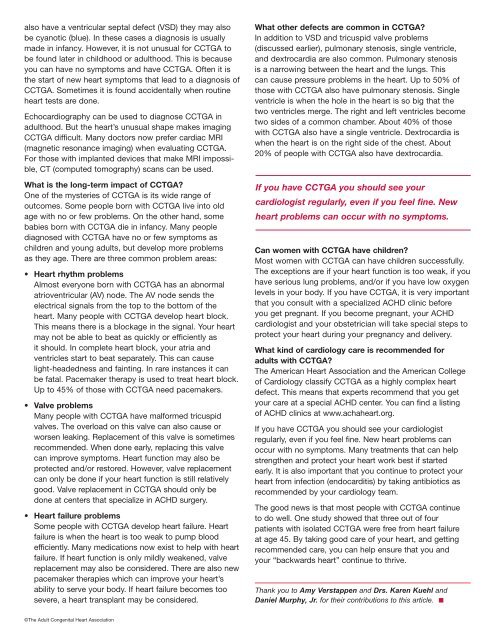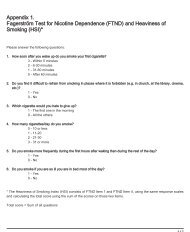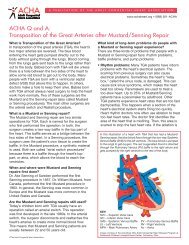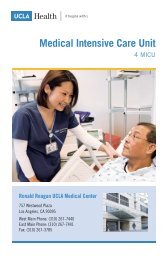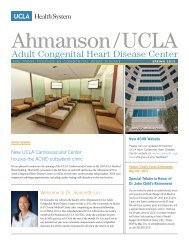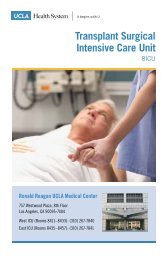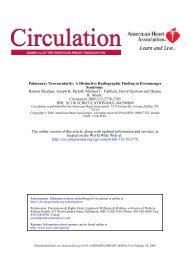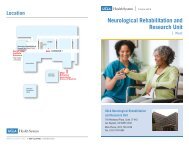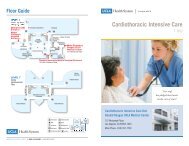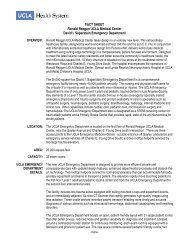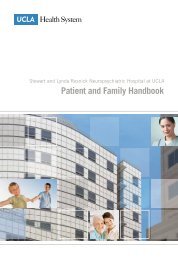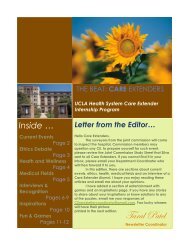CCTGA - Adult Congenital Heart Association
CCTGA - Adult Congenital Heart Association
CCTGA - Adult Congenital Heart Association
You also want an ePaper? Increase the reach of your titles
YUMPU automatically turns print PDFs into web optimized ePapers that Google loves.
also have a ventricular septal defect (VSD) they may also<br />
be cyanotic (blue). In these cases a diagnosis is usually<br />
made in infancy. However, it is not unusual for <strong>CCTGA</strong> to<br />
be found later in childhood or adulthood. This is because<br />
you can have no symptoms and have <strong>CCTGA</strong>. Often it is<br />
the start of new heart symptoms that lead to a diagnosis of<br />
<strong>CCTGA</strong>. Sometimes it is found accidentally when routine<br />
heart tests are done.<br />
Echocardiography can be used to diagnose <strong>CCTGA</strong> in<br />
adulthood. But the heart’s unusual shape makes imaging<br />
<strong>CCTGA</strong> difficult. Many doctors now prefer cardiac MRI<br />
(magnetic resonance imaging) when evaluating <strong>CCTGA</strong>.<br />
For those with implanted devices that make MRI impossible,<br />
CT (computed tomography) scans can be used.<br />
What is the long-term impact of <strong>CCTGA</strong>?<br />
One of the mysteries of <strong>CCTGA</strong> is its wide range of<br />
outcomes. Some people born with <strong>CCTGA</strong> live into old<br />
age with no or few problems. On the other hand, some<br />
babies born with <strong>CCTGA</strong> die in infancy. Many people<br />
diagnosed with <strong>CCTGA</strong> have no or few symptoms as<br />
children and young adults, but develop more problems<br />
as they age. There are three common problem areas:<br />
• <strong>Heart</strong> rhythm problems<br />
Almost everyone born with <strong>CCTGA</strong> has an abnormal<br />
atrioventricular (AV) node. The AV node sends the<br />
electrical signals from the top to the bottom of the<br />
heart. Many people with <strong>CCTGA</strong> develop heart block.<br />
This means there is a blockage in the signal. Your heart<br />
may not be able to beat as quickly or efficiently as<br />
it should. In complete heart block, your atria and<br />
ventricles start to beat separately. This can cause<br />
light-headedness and fainting. In rare instances it can<br />
be fatal. Pacemaker therapy is used to treat heart block.<br />
Up to 45% of those with <strong>CCTGA</strong> need pacemakers.<br />
• Valve problems<br />
Many people with <strong>CCTGA</strong> have malformed tricuspid<br />
valves. The overload on this valve can also cause or<br />
worsen leaking. Replacement of this valve is sometimes<br />
recommended. When done early, replacing this valve<br />
can improve symptoms. <strong>Heart</strong> function may also be<br />
protected and/or restored. However, valve replacement<br />
can only be done if your heart function is still relatively<br />
good. Valve replacement in <strong>CCTGA</strong> should only be<br />
done at centers that specialize in ACHD surgery.<br />
• <strong>Heart</strong> failure problems<br />
Some people with <strong>CCTGA</strong> develop heart failure. <strong>Heart</strong><br />
failure is when the heart is too weak to pump blood<br />
efficiently. Many medications now exist to help with heart<br />
failure. If heart function is only mildly weakened, valve<br />
replacement may also be considered. There are also new<br />
pacemaker therapies which can improve your heart’s<br />
ability to serve your body. If heart failure becomes too<br />
severe, a heart transplant may be considered.<br />
What other defects are common in <strong>CCTGA</strong>?<br />
In addition to VSD and tricuspid valve problems<br />
(discussed earlier), pulmonary stenosis, single ventricle,<br />
and dextrocardia are also common. Pulmonary stenosis<br />
is a narrowing between the heart and the lungs. This<br />
can cause pressure problems in the heart. Up to 50% of<br />
those with <strong>CCTGA</strong> also have pulmonary stenosis. Single<br />
ventricle is when the hole in the heart is so big that the<br />
two ventricles merge. The right and left ventricles become<br />
two sides of a common chamber. About 40% of those<br />
with <strong>CCTGA</strong> also have a single ventricle. Dextrocardia is<br />
when the heart is on the right side of the chest. About<br />
20% of people with <strong>CCTGA</strong> also have dextrocardia.<br />
If you have <strong>CCTGA</strong> you should see your<br />
cardiologist regularly, even if you feel fine. New<br />
heart problems can occur with no symptoms.<br />
Can women with <strong>CCTGA</strong> have children?<br />
Most women with <strong>CCTGA</strong> can have children successfully.<br />
The exceptions are if your heart function is too weak, if you<br />
have serious lung problems, and/or if you have low oxygen<br />
levels in your body. If you have <strong>CCTGA</strong>, it is very important<br />
that you consult with a specialized ACHD clinic before<br />
you get pregnant. If you become pregnant, your ACHD<br />
cardiologist and your obstetrician will take special steps to<br />
protect your heart during your pregnancy and delivery.<br />
What kind of cardiology care is recommended for<br />
adults with <strong>CCTGA</strong>?<br />
The American <strong>Heart</strong> <strong>Association</strong> and the American College<br />
of Cardiology classify <strong>CCTGA</strong> as a highly complex heart<br />
defect. This means that experts recommend that you get<br />
your care at a special ACHD center. You can find a listing<br />
of ACHD clinics at www.achaheart.org.<br />
If you have <strong>CCTGA</strong> you should see your cardiologist<br />
regularly, even if you feel fine. New heart problems can<br />
occur with no symptoms. Many treatments that can help<br />
strengthen and protect your heart work best if started<br />
early. It is also important that you continue to protect your<br />
heart from infection (endocarditis) by taking antibiotics as<br />
recommended by your cardiology team.<br />
The good news is that most people with <strong>CCTGA</strong> continue<br />
to do well. One study showed that three out of four<br />
patients with isolated <strong>CCTGA</strong> were free from heart failure<br />
at age 45. By taking good care of your heart, and getting<br />
recommended care, you can help ensure that you and<br />
your “backwards heart” continue to thrive.<br />
Thank you to Amy Verstappen and Drs. Karen Kuehl and<br />
Daniel Murphy, Jr. for their contributions to this article. ■<br />
©The <strong>Adult</strong> <strong>Congenital</strong> <strong>Heart</strong> <strong>Association</strong>


